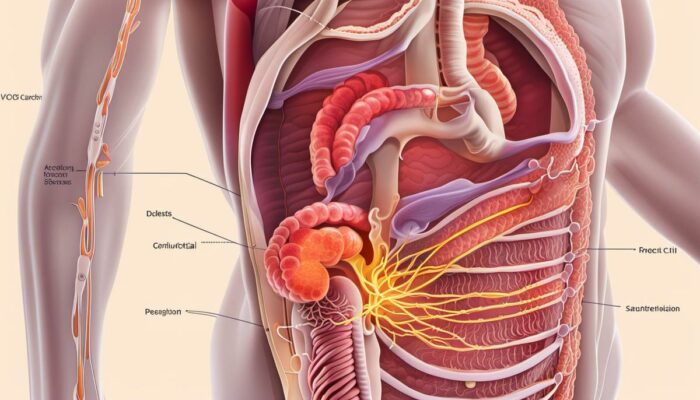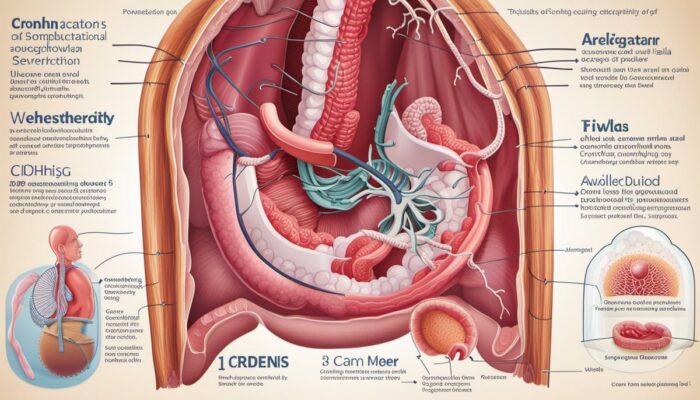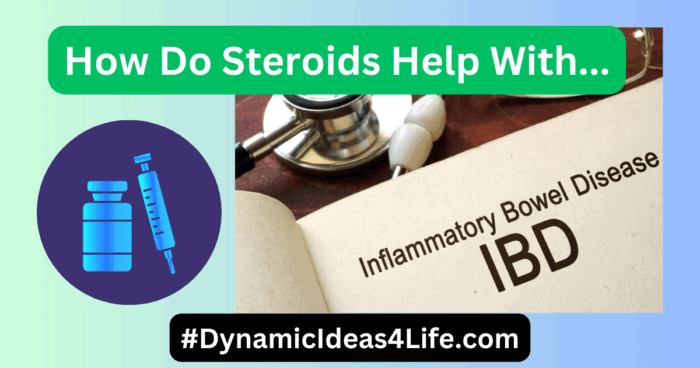Crohn’s disease is an inflammatory bowel disease, characterized by chronic inflammation of the digestive tract. It can rear its head among all age groups, but it is commonly diagnosed in people between the ages of 15 and 35. While Crohn’s disease can be a daunting condition, understanding its symptoms and effects can demystify the disease, making it more manageable.
In this comprehensive overview, we aim to unravel the biology of Crohn’s disease, dive deep into the digestive and non-digestive symptoms, explore potential complications, and explain when to seek medical attention. This should serve as a guide, aiding you in understanding the multifaceted nature of Crohn’s disease, the different ways it can manifest itself, and most crucially, how to respond effectively.
The Basics of Crohn’s Disease
An Overview of Crohn’s Disease
Crohn’s disease is a chronic inflammatory condition affecting the gastrointestinal tract, essentially any segment within it, from the mouth to the anus. Its inflammatory nature distinguishes it from other forms of inflammatory bowel disease (IBD), such as ulcerative colitis, which only affects the colon and rectum.
Long-term inflammation caused by Crohn’s can lead to severe damage to the affected areas of the digestive tract, including ulcers and scar tissue, which might cause painful symptoms and complications.
Who is at Risk?
While Crohn’s disease can occur at any age, it is primarily diagnosed in individuals between the ages of 15 and 30. But there is another smaller peak in incidence later in life, between the ages of 50 and 70. It equally affects males and females.
Moreover, individuals of Jewish descent and white race have a heightened risk, and it’s more common in developed countries, urban areas, and northern climates.
Family history also plays a significant role; if a close relative, such as a parent or sibling, has the disease, your chances of having it considerably increase.
Causes and Triggers of Crohn’s Disease
The exact cause of Crohn’s disease is unknown, but it’s most likely due to an interaction of genetic, environmental, and immune system factors. Some theories suggest it might be a result of an abnormal response to gut bacteria in genetically susceptible individuals.
Several triggers could prompt a flare-up of symptoms, including smoking, nonsteroidal anti-inflammatory drugs (NSAIDs), and illness or infection. Stress doesn’t cause the disease but can exacerbate symptoms.
Common Symptoms of Crohn’s Disease
Crohn’s Disease’s symptoms vary widely, depending on the severity and location of the inflammation. Common symptoms include persistent diarrhea, abdominal cramping and pain, rectal bleeding, weight loss, and fatigue.
On the other hand, less common but severe symptoms may include fever, night sweats, loss of appetite, and delayed growth or sexual development, in children.
Severe Complications Associated with Crohn’s Disease
In severe cases, untreated Crohn’s disease can lead to potentially life-threatening complications. These may include bowel obstruction, fistulas (abnormal connections between different parts of the bowel or between the bowel and other body parts), abscesses, malnutrition, anaemia, and an increased risk of colon cancer.
Understanding the signs and indications of Crohn’s Disease is essential, particularly if you have any suspicions of developing it or if you are already diagnosed and feel that your condition may be worsening. Consulting with a medical professional in such instances will aid in better management and mitigation of the disease.

Digestive Symptoms of Crohn’s Disease
Persistent Diarrhoea
Diarrhoea, characterised by loose and watery stools, is a common and persistent symptom of Crohn’s disease, often causing significant disruptions to an individual’s routine. The intensity of bowel movements can range greatly between victims, with reports of as low as four to an extreme of over twenty occurrences per day.
This accelerated bowel movement is usually due to the inflammation in the digestive tract, causing the body to rush the process of digestion. As a consequence, there is less time for water absorption in the colon, which results in persistent diarrhoea.
Abdominal Pain and Cramping
Another primary symptom of Crohn’s disease is abdominal pain and cramping. This discomfort is generally located in the lower right side of the abdomen, but the pain can occur anywhere along the digestive tract.
Abdominal pain related to Crohn’s disease usually worsens after meals. The reason for this pain and cramping is due to the inflammation and swelling in the lining of the digestive tract, which can result in an obstruction or blockage in severe cases.
These blockages disrupt the natural movement of food through the digestive system, leading to painful cramps.
Rectal Bleeding
Rectal bleeding is another primary symptom associated with Crohn’s disease. This bleeding is often bright red and may be due to ulcers in the colon or rectum. In individuals with Crohn’s disease, areas of inflamed and damaged digestive tract lining can break down to form ulcers, which leads to bleeding.
Oftentimes, this blood is passed along with stools making them look darker and tarry. In some severe cases, the blood may be visible in the toilet bowl. This symptom should not be ignored and should be brought to the attention of healthcare professionals as soon as possible.
How Crohn’s Disease Affects the Digestive Tract
Crohn’s disease can affect any part of the digestive tract, from the mouth all the way to the rectum. However, most commonly, it impacts the lower part of the small intestine and the beginning of the large intestine.
The disease causes inflammation that extends deep into the layers of the bowel wall, leading to the myriad of aforementioned digestive symptoms.
Over time, chronic inflammation can lead to more permanent damage such as the formation of scar tissue, which can narrow the digestive tract and lead to complications such as bowel obstructions.
Recognising the effects that Crohn’s disease can have on the digestive system is instrumental to managing the condition. By understanding potential symptoms, an individual is better equipped to anticipate their experience, leading to a more timely diagnosis and effective course of treatment.

Non-Digestive Symptoms of Crohn’s Disease
Tiredness
One widespread non-digestive symptom of Crohn’s disease is a profound sense of tiredness. This is not the familiar fatigue experienced after a strenuous day or poor sleep, but rather a constant, unrelenting exhaustion that rest does little to alleviate. It is believed that this is due to the body’s ongoing immune response to inflammation, which consumes considerable energy and leaves individuals feeling utterly drained.
Weight Loss
Weight loss, despite maintaining a regular diet, is another hallmark of Crohn’s disease that manifests outside of the digestive tract. This occurs due to the inflammation in the digestive tract which prevents the body from adequately absorbing nutrients from the food consumed.
This leads to malnutrition and subsequent weight loss. Weight loss might also be a consequence of reduced appetite from associated symptoms of abdominal pain or nausea.
Skin Disorders
Crohn’s disease is often accompanied by various skin disorders. These disorders are a type of extra-intestinal manifestation, meaning they occur outside the digestive system. The link between Crohn’s disease and skin disorders is understood to be due to a mixture of immune malfunctions and genetic predispositions.
Erythema nodosum, for instance, is one such condition that can occur. It is characterized by tender red nodules usually appearing on the lower legs. Another condition, pyoderma gangrenosum, results in large ulcers typically on the legs as well.
Additionally, some people with Crohn’s disease can develop episodes of painful, swollen skin tags around the anal area.
Joint Pain
Joint pain is another symptom not immediately associated with a digestive disorder but is commonly observed in individuals with Crohn’s disease. Nearly 25% of individuals with Crohn’s disease exhibit symptoms of joint pain or arthritis.
The pain usually affects large joints such as knees or hips but can also impact smaller joints in the hands and feet. Such joint complications are believed to stem from changes in the body’s immune response related to Crohn’s, causing inflammation in these areas.
In essence, symptoms of Crohn’s disease extend far beyond the digestive tract and are varied in nature. If you can identify these symptoms early on, it can aid in a quicker diagnosis and allow medical professionals to devise more suitable treatment plans.
However, it’s essential to remember that due to their non-specific nature, these symptoms alone cannot conclusively confirm a diagnosis of Crohn’s disease.
Therefore, a comprehensive evaluation by medical experts is crucial.

Potential Complications and Severity
The Possible Complications Associated with Crohn’s Disease
As a chronic inflammatory bowel disease (IBD), Crohn’s disease can profoundly alter an individual’s life. The spectrum and severity of possible complications can vary widely from person to person. One major complication that can arise is bowel obstruction.
This happens when constant inflammation leads to the thickening of the digestive tract, subsequently causing either a partial or complete obstruction of bowel passage.
Crohn’s Disease and Ulcers
Another common complication is the development of ulcers, which are open sores that can arise anywhere in the digestive tract, including the mouth, anus, and primarily, the small intestine. Often these ulcers can lead to additional complications, like the creation of fistulas.
Crohn’s Disease and Fistulas
A fistula is an abnormal connection between different parts of your intestine, or between the intestine and another organ or skin. Fistulas occur when ulcers extend completely through the intestinal wall. These can develop complications themselves, including infections, abscesses, and even peritonitis, which is an inflammation of your abdomen’s lining.
The Severity of Crohn’s Disease Symptoms
The overall severity of Crohn’s disease symptoms can largely vary from one individual to another. Some experience only mild symptoms, whilst others go through severe and debilitating phases.
The symptoms can also fluctuate in their occurrence, where some individuals might experience long periods of moderate or mild symptoms, followed by flare-ups of severe symptoms.
Factors Influencing Severity of Crohn’s Disease
Many factors can influence the severity of Crohn’s disease symptoms. These can range from the individual’s overall health and lifestyle choices such as diet and exercise to the severity of inflammation and the area of the digestive tract affected.
Stress levels, smoking habits, and the use of certain medications can also exacerbate symptoms. Moreover, other illnesses, genetic predisposition, and even environmental factors can impact the expression, management, and progression of the disease.
For individuals battling Crohn’s disease or providing care for those affected by this condition, it’s of utmost importance to understand the complications and factors that influence symptom severity. Such knowledge is instrumental in spotting early signs of the disease, managing symptoms efficiently, and mitigating their impact on the patient’s quality of life.

When to Seek Medical Attention for Crohn’s Symptoms
Recognising Symptoms of Crohn’s Disease
Crohn’s is a chronic condition causing inflammation in the digestive tract, producing symptoms varying from mild discomfort to severe complications. If diagnosed with this disease, it is essential to pay close attention to your body’s signals and seek professional medical intervention at the first signs of unusual symptoms.
The presence of these could be an indication of escalating illness or developing complications requiring swift treatment.
Common Symptoms of Crohn’s Disease
Normally, Crohn’s disease symptoms can vary significantly among patients. They may experience periods of intense disease activity, known as flare-ups, and times when few or no symptoms are apparent, called remissions.
Typical signs of this illness encompass persistent diarrhoea, abdominal pain and cramping, loss of appetite, weight loss, fatigue, and fever.
Additionally, patients may also suffer from symptoms outside the digestive tract, such as joint pain, skin disorders, eye inflammation, and anaemia.
Troubling Symptoms That Require Immediate Medical Attention
It is important to learn to distinguish ‘everyday’ Crohn’s symptoms from those signalling potential medical emergencies. If you deal with unrelenting vomiting, severe abdominal pain, bloating, constant fever, night sweats, extreme fatigue, unexplained weight loss, or persistent diarrhoea despite treatment, you should seek medical attention immediately.
These could indicate a more serious underlying condition such as abdominal obstruction, perforation, or severe infection, which might necessitate immediate intervention.
When to Consult Your Doctor
If you’ve been diagnosed with Crohn’s disease and your symptoms become more severe, occur more frequently, or do not improve with rest or medication, you should consult your doctor. If you’ve been under treatment and you experience new symptoms or side effects from the medication, it’s crucial to discuss these changes with your healthcare provider.
Managing Crohn’s Disease
A balance between both professional and self-care is crucial for managing Crohn’s disease. Regular check-ups, a healthy diet, adequate exercise, and stress management can all contribute to an improved quality of life.
Nevertheless, always remember to keep open lines of communication with your healthcare team and contact them whenever you have concerns about your symptoms.
In conclusion, understanding Crohn’s disease, its potential complications, and when to seek immediate medical assistance is pivotal in effectively managing this condition.
Those with Crohn’s disease are encouraged to familiarise themselves with these symptoms, empowering them to make informed decisions about their health.
Being aware of your body’s changes and promptly responding to troubling symptoms is key in maintaining control over this lifelong illness.

Final Word
The intricate nature of Crohn’s disease can make it challenging to identify and manage. However, equipped with the appropriate knowledge, potential patients, family members, or friends supporting those with Crohn’s can be prepared. Recognising the variety of digestive and non-digestive symptoms, understanding potential complications, and being aware of when to seek medical help can make a significant difference.
Relatively minor symptoms can be indicative of deeper complications, and early intervention is often key. In the end, it boils down to a collective effort – understanding the disease, acknowledging its many forms, and making informed decisions. Every bit of knowledge contributes, and together, we can tackle Crohn’s disease more effectively. [Read More About IBS & IBS Relief In Our Articles HERE<<}


Anxiety and Depression best ways to lower blood sugar BiOptimizers blood pressure supplements blood sugar support supplements Digestive Enzymes Supplement digital products Dr Sam Robbins Erectile dysfunction Exercise Gut Health Healthy Living heart health HFL how to lower blood sugar levels How To Lower Cholesterol insulin resistance joint health supplement Keto keto dieting Keto Diet Weight Loss leaky gut supplements leptin resistance list Magnesium deficiency Matt Gallant mental health multivitamins Nootropics nutrient supplements Probiotics Probiotic Supplements proteolytic enzymes reverse type 2 diabetes stress and anxiety stress relief vitabalance vitapost Wade Lightheart weight loss articles weight loss diet plans weight loss product reviews weight loss supplements weight loss supplements that work weight loss tea
